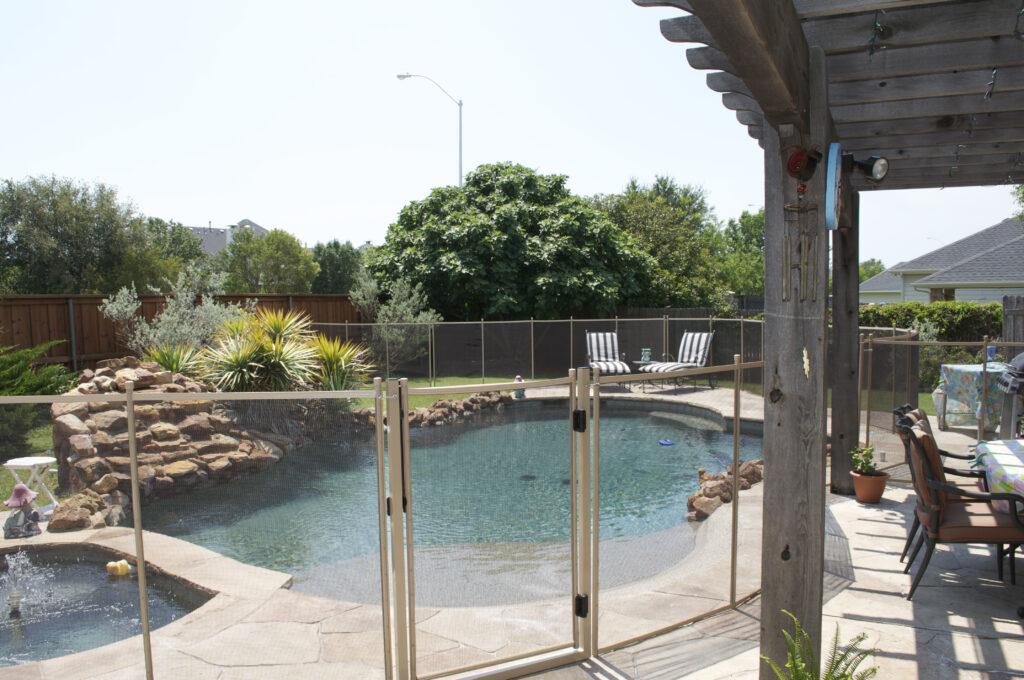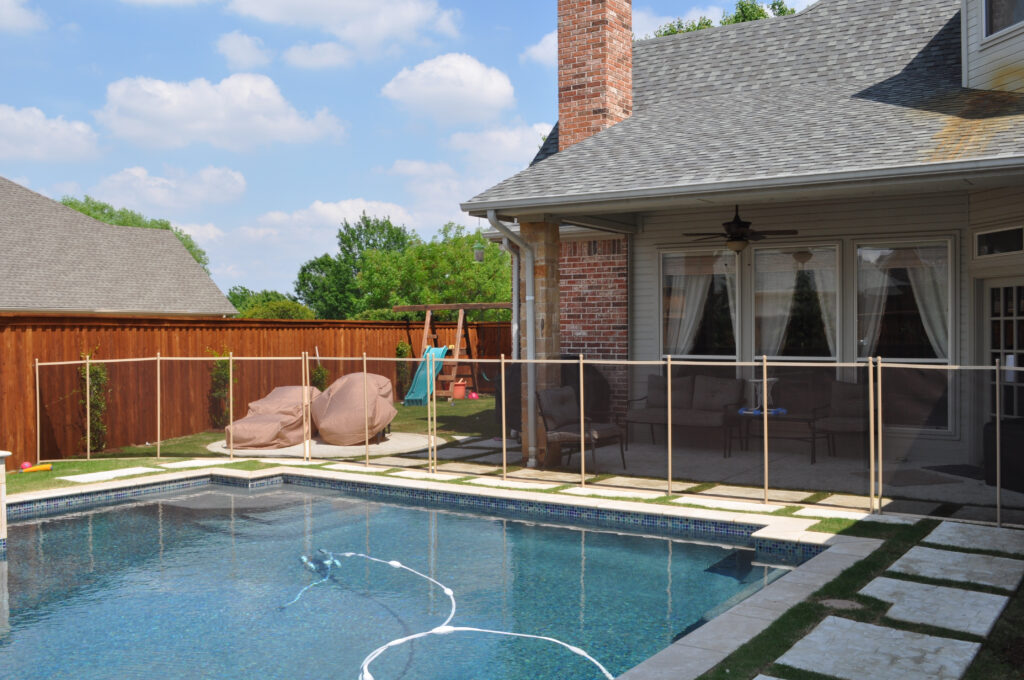Planning to install a pool this year? Or finally turning your backyard into that relaxing oasis you’ve dreamed of? Whether you’re designing a brand-new space or upgrading your current setup, pool safety should be just as important as the pool design.
If you have young children, pets, or frequent guests, adding a mesh pool fence is one of the most effective and affordable ways to protect your loved ones. But how much does it actually cost?
This guide breaks down the pool safety fence cost from per-foot pricing to upgrades like self-closing gates so you can make a confident, informed decision without the guesswork.

On average, a professionally installed mesh pool safety fence costs between $17 and $35 per linear foot, depending on the layout of your pool, gate selections, surface type, and custom features. Custom configurations or specialty deck materials (like pavers, stone, or turf) may increase the cost by an additional $1 to $15 per linear foot.
Let’s say you plan to install a mesh pool fence around a 150 linear foot perimeter, and the fence needs to be set back by a few feet away from the pool, as per the local or statewide safety codes. In that case, you should expect to pay somewhere between $2,550- $5,250. If your surface includes pavers, stone, or uneven terrain, expect to pay an additional $150- $2,250, depending on the complexity of the surface.
At Pool Guard, we make the process simple and transparent. Our team will measure your pool area, assess the surface conditions, and provide a custom quote based on your specific needs. You’ll receive a clear estimate with no added cost if you’re enclosing a standard rectangular pool or a uniquely shaped design.
Several variables affect the total cost of a mesh pool safety fence. Here’s a breakdown of the most common factors that determine your final price:
The more linear footage required, the higher your total cost. A small plunge pool may need only 60–80 feet of fencing, while larger or uniquely shaped pools may require 120–180+ linear feet. Your layout also plays a critical role. Rounded edges, curved shapes, and custom-sized footprints often require additional sections, angled posts, and more flexible fittings, which can increase material usage and installation time.
What’s worth noting is that pools with irregular shapes or landscaping obstacles (like spas, planters, or retaining walls) may need 10–15% more fencing than the measured perimeter to ensure full coverage and proper setback.
While the standard pool safety barriers are typically 4 feet tall, the height requirements vary by state and local code. Some areas mandate a minimum of 4 feet, while others, like California, require fences to be at least 5 feet tall. Other states may enforce even stricter pool fence height requirements. Taller fences provide added protection but require more material in their installation, further raising the pool fence cost by a few dollars per foot. A 5-foot fence may cost $1–$3 more per linear foot when compared to a 4-foot option. For 150 feet, that’s an additional $150–$450, depending on features and finish
Gates are a required component of any mesh pool safety fence, not just for convenience, but to meet building codes and ASTM F2286 standards. A pool fence without a compliant gate poses a serious safety risk, especially for children who are left unsupervised. At a minimum, the system must include a self-closing, self-latching gate that automatically shuts and secures behind you. While a manual gate may be included in some standard installations, most jurisdictions require an upgraded gate with spring-loaded hinges and a compliant latch, positioned at least 54 inches from the ground.
These upgraded gate systems typically add $300 to $500 to the total pool fence price, depending on the materials, surface type, and latch mechanism used. For added safety, Pool Guard offers the Magna Latch, a top-pull magnetic safety latch designed for residential and commercial pool gates. This latch features a key-lockable mechanism, auto-latching with powerful magnets, and weather-resistant construction. Priced at $135, it includes two keys and a full installation kit.
Always confirm local requirements, as gate specifications vary by region and are essential for full code compliance.
Some consider tackling pool fence installation themselves, attracted by the potential cost savings. DIY mesh fence kits may appear cost-effective upfront, typically ranging from $12 to $22 per linear foot. However, they often lack key safety elements such as reinforced tension systems, high-grade mesh materials, and proper anchoring hardware for long-term stability. Without professional tools or expertise, improper spacing, shallow post depths, or uneven installation can compromise the entire barrier and potentially violate local safety codes.
By contrast, professional installation ensures:
Most professionally installed mesh pool fences cost between $17 and $35 per foot, depending on the layout, surface conditions, and optional upgrades. While it may be a slightly higher upfront investment, the added safety, peace of mind, and regulatory compliance often make it the smarter long-term choice.

Mesh pool fences offer one of the highest returns on safety investment for any homeowner with a swimming pool. Not only do they help prevent accidental access by children and pets, but they also support legal compliance with most local and state barrier regulations. Beyond safety, they offer peace of mind knowing your backyard is secure even when you’re not watching every moment. While the initial pool fencing cost may range from $17 to $35 per foot, mesh fencing is designed to last for years with minimal maintenance.
Unlike wood or metal options that may warp or rust, high-quality mesh is UV-resistant, weather-tough, and removable when needed. The long-term durability, flexibility, and safety assurance make it an investment well worth the cost.
While mesh pool fences are already one of the most cost-effective safety options, there are smart ways to reduce your overall investment without sacrificing quality:
These strategies can help keep your pool safety fence costs within budget while ensuring long-term protection.
A mesh pool safety fence offers the ideal balance of affordability, compliance, and protection. It’s a one-time investment that safeguards your family, enhances your property, and aligns with safety codes across the country. Unlike other fencing options, mesh is lightweight, low-maintenance, and designed for real-world use, whether you’re managing kids, pets, or guests.
Get a custom quote today on the pool safety fence cost and take the next step toward creating a safer, more secure backyard. Pool Guard™ is here to help you every step of the way, from measurement to installation, with expert guidance and premium materials you can trust.
Please fill out the form below with your information. Your local dealer will be notified about your inquiry.
Please fill out the form below with your information. Your local dealer will be notified about your inquiry.